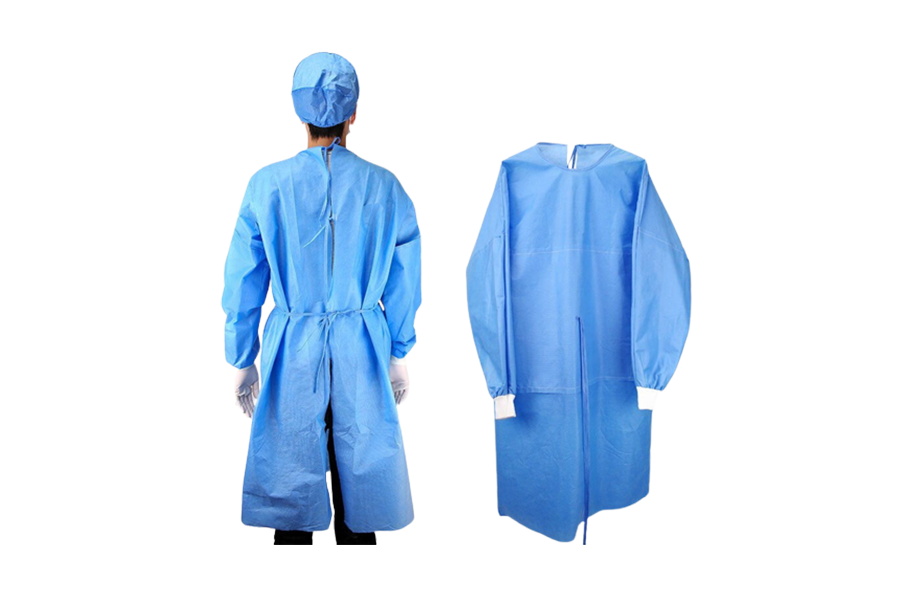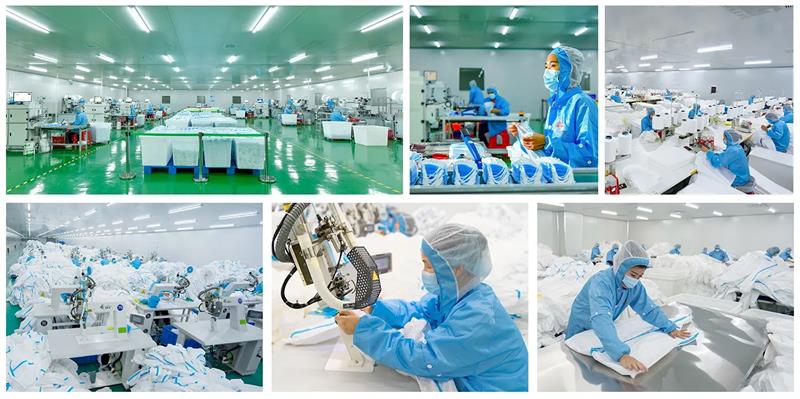About Us
What is a surgical gown
A surgical gown is a specialized garment worn by medical professionals during surgical procedures. Its primary purpose is to provide a barrier that minimizes the transmission of infectious agents to the patient’s surgical wound, thereby aiding in the prevention of postoperative infections. The material used in these gowns is selected for its protective properties, effectively blocking viruses, bacteria, and other potentially harmful invaders that medical personnel may encounter.

surgical gown
Material of surgical gown
Surgical gowns are available in a variety of materials, each offering specific benefits. Cotton gowns, known for breathability, fall short in terms of protection. High-density polyester gowns provide both comfort and water repellency. Composite film gowns excel in safeguarding against blood, bacteria, and viruses. PP spunbond nonwoven fabric is a cost-effective option but offers less resistance to water and viruses. Polyester-wood pulp fabric is commonly used for disposable gowns. For premium performance, SMS nonwoven fabric stands out, offering resistance to alcohol, blood, oil, static, and bacteria. Each material serves a distinct purpose, striking a balance between comfort and protection in surgical environments.
Our Services
Types of Surgical Gowns
Surgical gowns play a crucial role in maintaining a sterile environment during medical procedures. Let’s delve into two common types: Surgical Gowns and Reinforced Surgical Gowns.

Surgical Gown

Reinforced Surgical Gown
Surgical gowns vs. isolation gowns
Disposable Surgical Gowns:
These gowns find application in specialized operating rooms for invasive procedures following thorough sterilization. They offer a sterile and impermeable barrier, ensuring aseptic conditions during patient treatment.
Disposable Isolation Gowns:
Worn in situations where there is a risk of splashes from the patient’s blood, bodily fluids, secretions, or excretions. Healthcare providers utilize them when entering critical areas like ICU, NICU, or isolation wards, depending on the purpose of entry and the nature of patient interaction.


Disposable Surgical Gowns:
China established standards (YY/T0506) for surgical gowns in 2005, aligning with the European standard EN13795. These guidelines outline criteria for material barrier properties, strength, microbial penetration resistance, and comfort. Surgical gowns should be one-piece, sterile, without a hood, and equipped with elastic cuffs for easy use and compatibility with sterile gloves.
Disposable Isolation Gowns:
Typically crafted from non-woven fabric or a combination of materials with enhanced barrier properties, such as plastic films. Isolation gowns are designed to cover the entire body, acting as a physical barrier against microbial and material transmission. They should possess attributes like impermeability, durability, and tear resistance.
Why Choose Jinye Surgical Gown
Jinye stands out in the surgical gown and PPE industry by embracing cutting-edge technology. Our products incorporate the latest advancements, ensuring superior performance, enhanced protection, and compliance with industry standards. From materials to manufacturing processes, we prioritize innovation to deliver top-notch solutions.
Jinye maintains rigorous quality control measures throughout the production process. Our surgical gowns undergo thorough testing, adhering to international standards for barrier properties, microbial resistance, and durability. With a commitment to excellence, we provide healthcare professionals with reliable and high-quality protective apparel.

PPE Solution
Download Full Catalog to View More Products
Download our product catalog for more PPE solutions.

CONTACT US AND GET YOUR SOLUTION
Frequently Asked
Surgical Gown FAQs: Questions Answered
Yes, surgical gowns can be designed with fluid-resistant properties to provide additional protection against blood, bodily fluids, and other liquid contaminants.
Look for certifications such as those from regulatory bodies like the FDA or international standards like ISO, ensuring that the gowns meet quality and safety standards.
Used disposable surgical gowns should be disposed of according to local regulations for medical waste management, typically in designated containers or bags.
Surgical gowns should meet specific performance requirements such as barrier effectiveness, tear resistance, linting properties, and liquid repellency, as outlined in standards like AAMI PB70.
Yes, surgical gowns can be customized with features like additional reinforcement, special closures, or specific material choices based on the requirements of different procedures or user preferences.

